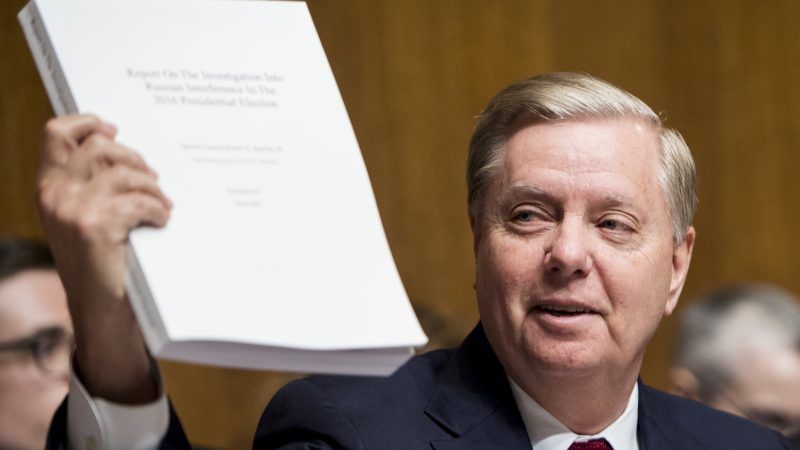Lindsey Graham Continues To Demonstrate Everything That's Wrong With Republicans in the Age of Trump
Graham's "evolution" during the Trump years has been more dramatic than most, but his performance on Wednesday was on par with how many other Republicans have handled the explosive details in the Mueller report.

Almost three years to the day from when he issued a now all-too-prescient warning on Twitter—"If we nominate Trump, we will get destroyed….and we will deserve it"—Sen. Lindsey Graham (R–S.C.) gave a performance that reminds us of just how deeply Trumpism has corrupted the Republican Party.
Graham, as chairman of the Senate Judiciary Committee, was nominally the man in charge of the committee's hearing on Monday—a hearing in which Attorney General William Barr offered his testimony and answered questions about his handling of the release of the report written by Special Prosecutor Robert Mueller.
Right from the start, Graham made clear that he did not see the hearing as an opportunity to clear up the remaining confusion about key differences between Barr's initial statements on the Mueller report and the details in the Mueller report itself. Instead of seeking answers, Graham picked up where Barr had left off in doing damage control for the president.
"After all this time and all this money, Mr. Mueller and his team concluded there was no collusion," said Graham, borrowing from Trump's favorite characterization of the Mueller report's outcome.
"As to obstruction of justice, Mr. Mueller left it to Mr. Barr to decide," Graham continued. "After two years and all this time, he said to Mr. Barr 'you decide' and Mr. Barr did."
Incredibly, that's an interpretation—some might say spin—that's even more generous to Trump than Barr's original framing of the Mueller report, which Mueller has criticized for not fully capturing the "context, nature, and substance" of his investigation.
Graham's claim that Mueller found "no collusion" is an oversimplification, at best, of the first half of the report, which details numerous attempts by both the Trump campaign and the Russian government to find common ground during 2016. Whether you agree with the senator's assessment likely depends on your existing opinions about what, exactly, constitutes "collusion."
But Graham is objectively wrong to claim that Mueller left the obstruction question for Barr "to decide." In fact, Mueller explicitly tossed that specific ball into Congress' court.
"The conclusion that Congress may apply the obstruction laws to the President's corrupt exercise of the powers of office accords with our constitutional system of checks and balances and the principle that no person is above the law," the Mueller report states.
That's probably the right thing to do since longstanding Department of Justice precedent says a sitting president cannot be indicted. Mueller's report outlines 10 times that Trump attempted to interfere with the investigation—going as far as telling then-White House counsel Don McGahn "Mueller has to go. Call me back when you do it." Mueller was allowed to continue his investigation only because McGahn flat-out refused to follow a direct order from the President of the United States.
That same pattern emerges again and again in the Mueller report's damning second volume. "The President's efforts to influence the investigation were mostly unsuccessful, but that is largely because the persons who surrounded the President declined to carry out orders or accede to his requests," the Mueller report says.
How did Graham describe Trump's actions?
"The president never did anything to stop Mueller from doing his job," Graham said Wednesday.
Members of Congress are free to draw their own conclusions from the Mueller report, of course, and that is exactly what Mueller appears to have intended by tossing the obstruction question into their court.
And to be fair, the Mueller investigation and report have driven nearly everyone in Washington to the brink of insanity. When Trump's critics inflate details of the report to create wild conspiracy theories completely unsupported by the facts, they are doing an equally significant disservice to the dialogue surrounding the president and what he may have done or not done with regard to Russia and the subsequent investigation.
Still, Graham's mischaracterization of both the report's findings and the legal process used to arrive at them is a telling indication that GOP leadership remains loyal to Trump's cult of personality.
Graham's "evolution" during the Trump years has been more dramatic than most, but his performance on Wednesday was on par with how many other Republicans have handled the explosive details in the Mueller report. Instead of using his immense power as the chairman of a powerful Senate committee to determine whether Trump's presidency should continue, or at least to get straight answers about why Barr apparently misled Americans about the content of Mueller's report, Graham is now making a show of rolling over for a president that he once said was a "kook" and "unfit for office."


Show Comments (164)